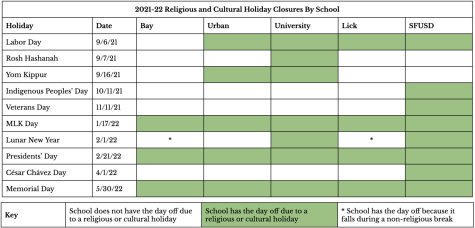Religious and cultural holidays at Urban
The Urban handbook’s religious observances policy asserts, “we honor religious pluralism in our culture and respect the practice of diverse religions among our families. It is our policy to allow any student, faculty or staff member to miss school in order to observe a religious holiday without it counting as an absence or personal day.” However, many students feel that the reality of observing a religious or cultural holiday is not reflected in this statement.
“Taking a day off from school kind of sets you back a whole week … it’s a bit stressful,” said Mia Fessel ‘25. “It’s a little hard to enjoy [Yom Kippur because] I’m just stressed out about what I’m missing.” She feels that classes at Urban move particularly fast. While the school offers excused absences for religious and cultural holidays, absences often can increase students’ heavy workload.
“Sometimes classes just move so fast that if you miss one, especially a science class, you just feel automatically behind because they covered so much material, so that can be really tricky,” said Julia Susser ‘22. If missing a single day of classes sets students back so much, is taking the day off for a religious or cultural holiday worth the stress to Urban students?
“I find that even just taking a little bit of time off can be a reset, which is necessary, but when compared with the stress consequences of when you do take that day off, it sort of loses its purpose,” said Lily Halbert-Alexander ‘24. She recalls taking the day off for Rosh Hashanah last year and constantly thinking about all the work that she was missing. Despite the Torah expressly forbidding work on Rosh Hashanah, Noa Marks ‘23 also remembers her academic life cutting into the day she took off for Rosh Hashanah, to the point where she was forced to do homework during her day off.
Assistant Head for Student Life Charlotte Worsley said that the Urban administration works hard to create a space where students feel welcomed to take the day off for religious and cultural holidays. Often, this comes in the form of allowing students to take an excused absence on the day of a given holiday. However, Worsley stresses that Urban’s religious observances policy can appear in different ways. “We’re trying to make sure that we’re not standardizing a practice [of how we encourage students to celebrate their religion and culture] based on the way certain religions honor their holidays,” she said. “I know with Diwali and for some families with Lunar New Year, what we’ve done is we’ve given people homework exemptions [because these holidays are often celebrated in the evening]. We try to fit it to what the needs are.”
Similarly, the administration chooses what holidays Urban students have off depending on the holidays students celebrate. After seeing the high number of students taking the day off for Yom Kippur, Urban chose to give the day off to all students. While school is still in session on some holidays, such as Diwali and Lunar New Year, Worsley said that depending on the number of Urban students who take the day off in the coming years, this policy could change. This year, 2 students took the day off for Diwali, 8 for Lunar New Year, and 19 for Rosh Hashanah. “We’re just waiting, watching those numbers,” she said.
School holidays are not standardized across all Bay Area schools. While there are some holidays that all schools have off, such as MLK Day and Presidents Day, there are many holidays where Urban’s policy differs from other Bay Area high schools. For example, Urban does not give students Indigenous Peoples’ Day off while SFUSD high schools do, showing that the cultural and religious makeup of schools can be significantly different.
Urban’s religious observances policy continues to evolve as old students graduate and new students enter the school. Worsley hopes that the policy will support students and families in celebrating the religious and cultural holidays that are important to them. When asked about the administration’s openness to altering the policy, Worsley said, “Urban is trying to make sure that the [religious observances policy] grows out of the experience of a wide range of religions. … [We] always encourage students who don’t feel like that’s being met to come talk about it because there may be something that we’re missing.”












